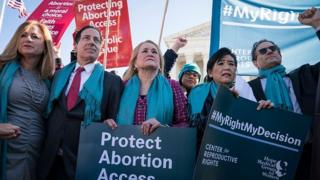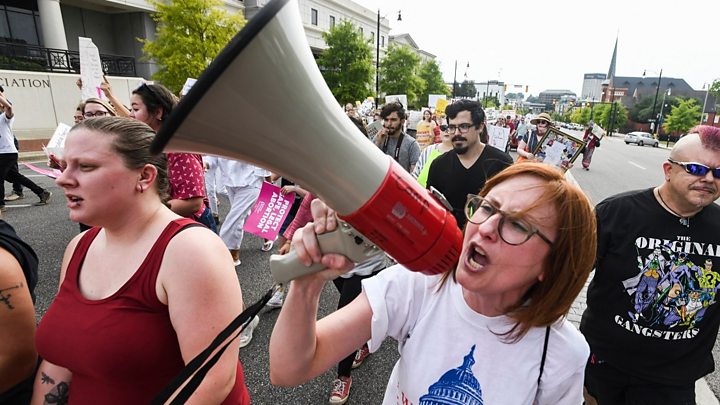Trump says new court ruling on abortion ‘possible’
 Image copyright Getty Images
Image copyright Getty Images President Donald Trump has said it is “certainly possible” that his Supreme Court pick will be involved in a ruling revisiting the landmark 1973 decision that legalised abortion in the US.
Mr Trump said he did not discuss abortion rights with Amy Coney Barrett before choosing her for the top court.
But Ms Coney Barrett was “certainly conservative in her views”, he said.
She has been chosen to replace the late liberal Justice Ruth Bader Ginsburg but awaits Senate confirmation.
Democrats and women’s rights advocates fear Judge Barrett, a socially conservative jurist, could play a decisive role in any ruling overturning the 1973 judgment to legalise abortion, known as Roe v Wade.
Should Judge Barrett’s nomination be confirmed, conservative-leaning justices will hold a 6-3 majority on the Supreme Court, shifting its ideological balance for potentially decades to come.
Mr Trump said he did not know how the judge would vote on the issue if her nomination was approved.
“Mostly I’m looking for somebody who can interpret the constitution as written. She is very strong on that,” Mr Trump said in an interview with Fox & Friends on Sunday.
Mr Trump announced Judge Barrett’s nomination to the country’s highest court at the White House on Saturday, describing the 48-year-old as a “stellar scholar” with “unyielding loyalty to the constitution”.
The court’s nine justices serve lifetime appointments, and their rulings can shape US public policy on everything from gun and voting rights to abortion and campaign finance.
Judge Barrett is the third justice appointed by the current Republican president, after Neil Gorsuch in 2017 and Brett Kavanaugh in 2018.

The abortion issue took centre stage in Supreme Court confirmation hearings for Mr Gorsuch and Mr Kavanaugh.
Since then a number of conservative states have passed new abortion restrictions that could lead to legal challenges in the Supreme Court.
What is Roe v Wade, and why is it important?
Roe v Wade was the 1973 case that led to the legalisation of abortions in the US.
By a 7-2 vote, Supreme Court justices ruled that governments lacked the power to prohibit abortions.
The court’s judgement was based on the decision that a woman’s right to terminate her pregnancy came under the freedom of personal choice in family matters, as protected by the 14th Amendment of the US Constitution.
The ruling came after a 25-year-old single woman, Norma McCorvey under the pseudonym “Jane Roe”, challenged the criminal abortion laws in Texas that forbade abortion as unconstitutional except in cases where the mother’s life was in danger.
Henry Wade was the Texas attorney general who defended the anti-abortion laws.
The decision – on 22 January 1973 – remains one of the most controversial ever made by the Supreme Court.
In the decades since, states have adopted laws limiting abortion rights, spurring legal challenges and fractious political debates on a state and national level.
In contrast, more liberal US states have moved to implement their own laws to ensure abortion rights for their residents.
President Trump has previously expressed support for restricting access to abortion, but his views have shifted over time.
What did Trump say about Roe v Wade?
In Sunday’s interview with Fox & Friends, Mr Trump was asked whether he would like to see Roe v Wade challenged and overturned if Judge Barrett’s nomination was confirmed.
“I didn’t think it was for me to discuss that with her, because it’s something she is going to be ruling on,” Mr Trump said. “But if you look at her past actions and rulings, I think she may be in the category you mentioned, I don’t know.”
When asked whether a Supreme Court with a 6-3 conservative majority could rule on a “life issue”, Mr Trump said: “It’s certainly possible.”
He added: “Maybe they would do it in a different way. Maybe they would give it back to the states. You just don’t know what’s going to happen.”
Who is Amy Coney Barrett?
After graduating from Notre Dame University Law School in Indiana, she clerked for the late Justice Antonin Scalia. In 2017, she was nominated by Mr Trump to the Chicago-based 7th Circuit Court of Appeals.
She is described as a devout Catholic who, according to a 2013 magazine article, said that “life begins at conception”. This makes her a favourite among religious conservatives keen to overturn Roe v Wade.
LGBT groups have criticised her membership of a conservative Catholic group, People of Praise, whose network of schools have guidelines stating a belief that sexual relations should only happen between heterosexual married couples.
Judge Barrett has ruled in favour of President Trump’s hardline immigration policies and expressed views in favour of expansive gun rights.
Image copyright Reuters
The Senate – the upper chamber of the US Congress – will vote to confirm or reject Judge Barrett’s nomination.
Republicans hold a slim majority, but they already appear to have the 51 votes needed to get Judge Barrett confirmed.
Senate majority leader Mitch McConnell has vowed to hold a confirmation vote before the 3 November election.
Barring a surprise, Democrats seem to have few procedural options to prevent her gliding through the Senate to the Supreme Court bench.
Battle over Supreme Court
Image copyright Getty Images







